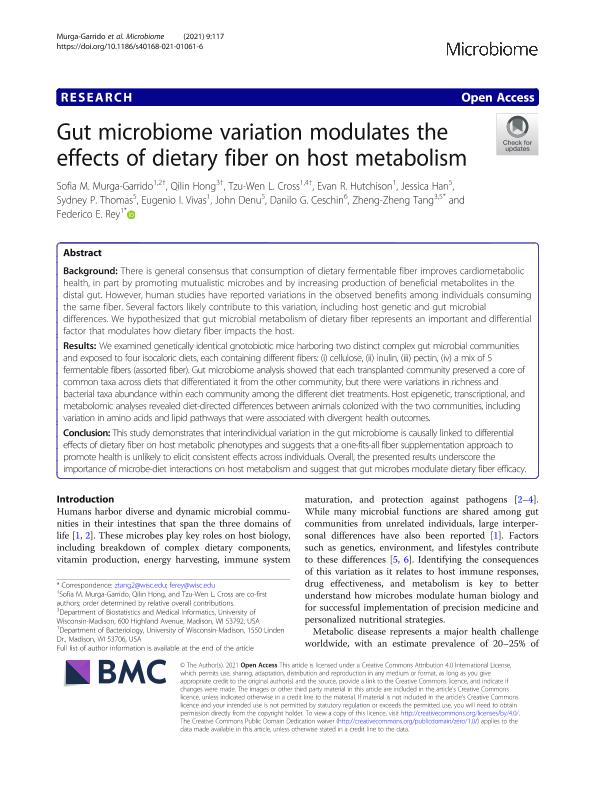Artículo
Gut microbiome variation modulates the effects of dietary fiber on host metabolism
Murga Garrido, Sofia M.; Hong, Qilin; Cross, Tzu Wen L.; Hutchison, Evan R.; Han, Jessica; Thomas, Sydney P.; Vivas, Eugenio I.; Denu, John; Ceschin, Danilo Guillermo ; Tang, Zheng Zheng; Rey, Federico E.
; Tang, Zheng Zheng; Rey, Federico E.
 ; Tang, Zheng Zheng; Rey, Federico E.
; Tang, Zheng Zheng; Rey, Federico E.
Fecha de publicación:
12/2021
Editorial:
BioMed Central
Revista:
Microbiome
ISSN:
2049-2618
Idioma:
Inglés
Tipo de recurso:
Artículo publicado
Clasificación temática:
Resumen
Background: There is general consensus that consumption of dietary fermentable fiber improves cardiometabolic health, in part by promoting mutualistic microbes and by increasing production of beneficial metabolites in the distal gut. However, human studies have reported variations in the observed benefits among individuals consuming the same fiber. Several factors likely contribute to this variation, including host genetic and gut microbial differences. We hypothesized that gut microbial metabolism of dietary fiber represents an important and differential factor that modulates how dietary fiber impacts the host. Results: We examined genetically identical gnotobiotic mice harboring two distinct complex gut microbial communities and exposed to four isocaloric diets, each containing different fibers: (i) cellulose, (ii) inulin, (iii) pectin, (iv) a mix of 5 fermentable fibers (assorted fiber). Gut microbiome analysis showed that each transplanted community preserved a core of common taxa across diets that differentiated it from the other community, but there were variations in richness and bacterial taxa abundance within each community among the different diet treatments. Host epigenetic, transcriptional, and metabolomic analyses revealed diet-directed differences between animals colonized with the two communities, including variation in amino acids and lipid pathways that were associated with divergent health outcomes. Conclusion: This study demonstrates that interindividual variation in the gut microbiome is causally linked to differential effects of dietary fiber on host metabolic phenotypes and suggests that a one-fits-all fiber supplementation approach to promote health is unlikely to elicit consistent effects across individuals. Overall, the presented results underscore the importance of microbe-diet interactions on host metabolism and suggest that gut microbes modulate dietary fiber efficacy. [MediaObject not available: see fulltext.]
Palabras clave:
GENERAL CONSENSUS
,
CARDIOMETABOLIC HEALTH
,
GNOTOBIOTIC MICE HARBORING
Archivos asociados
Licencia
Identificadores
Colecciones
Articulos(INIMEC - CONICET)
Articulos de INSTITUTO DE INV. MEDICAS MERCEDES Y MARTIN FERREYRA
Articulos de INSTITUTO DE INV. MEDICAS MERCEDES Y MARTIN FERREYRA
Citación
Murga Garrido, Sofia M.; Hong, Qilin; Cross, Tzu Wen L.; Hutchison, Evan R.; Han, Jessica; et al.; Gut microbiome variation modulates the effects of dietary fiber on host metabolism; BioMed Central; Microbiome; 9; 1; 12-2021; 1-26
Compartir
Altmétricas



